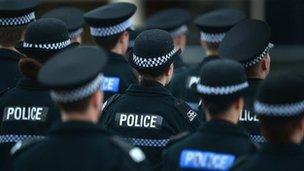Police Scotland announces increase in positive stop and search results
- Published

Police Scotland was established in April 2013
Police Scotland has announced an increase in the number of stop and searches which result in the seizure of drugs, weapons or alcohol.
Officers carried out a total of 519,213 stop and searches between April and December 2013.
This was a decrease of 0.2% on the same period the previous year.
However, they said positive results had increased from 13.9% of searches to 19.7%.
Police Scotland argued the strategy had contributed to a fall in violent crime since the creation of a single national force in April 2013.
More than 90% of all searches related to drugs, alcohol or weapons.
'Intelligence led'
Police said 37% of all searches undertaken to detect firearms yielded a positive result, with 166 firearms or associated items having been recovered.
An additional 4,273 weapons including knives were seized during stop and search operations across the country.
Each of Scotland's 14 policing divisions can employ stop and search when deemed necessary. People are searched either by consent or under powers conferred by legislation.
Police Scotland said that more than 70% of the stop and searches carried out were consensual, with around 28.5% conducted under the use of legislation.
Asst Ch Constable Wayne Mawson said: "Searches are targeted and intelligence led and often conducted with the consent of those involved.
"The decision to conduct a stop and search can and has in many cases resulted in harmful weapons, dangerous drugs and stolen property being recovered and is vital to ensuring that Police Scotland can continue to keep people safe."
Justice Secretary Kenny MacAskill said: "Stop and search is one tactic amongst many police use to cut crime, and Police Scotland's positive results so far suggest this is working.
"This builds on our most recent crime stats, which show violent crime falling by 47% between 2006/7 and 2012/13 and crimes of handling an offensive weapon at the lowest in 27 years, dropping by 60% in the same period."
England and Wales
Police presented a paper, external to the Scottish Police Authority (SPA) in August 2013, saying the creation of a single force had enabled a policy of local officers conducting searches, used for six years by the former Strathclyde force, to be rolled out across the country.
Of 612,110 stop and searches by Strathclyde in 2013, 84,081 (13.7%) revealed something suspicious. Police said the policy led to a 50% drop in violent crime.
Figures for England and Wales in 2012 showed 9% of searches on the street revealed a suspicious item.
The paper said there had been an overall 21% success rate in the same year across Scotland, but cautioned that some different categorisations made direct comparison impossible.
The paper revealed that Police Scotland had an overall performance target of 15% positive stop and searches, but individual officers did not have stop and search targets.
In November, the Equality and Human Rights Commission (EHRC) said black people were six times as likely as white people to be stopped in England and Wales in 2011-12.
In contrast, Strathclyde reported that 97% of people aged 16-29 stopped in 2012 were white. The black and minority ethic (BME) population of the Strathclyde police area in the 2011 census was recorded at 2.45% of the population.
- Published13 January 2014
- Published21 August 2013
- Published11 November 2013